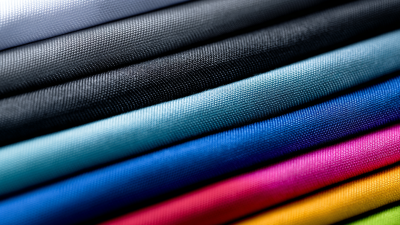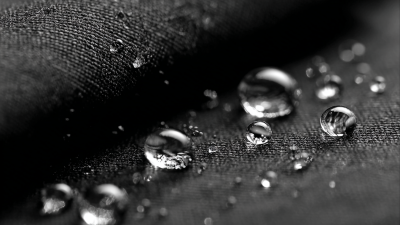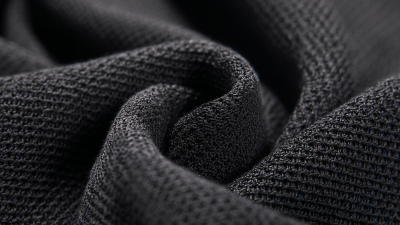- +86 13957580925
- 510515850@qq.com
- adela0928@163.com
In 2023, the fashion industry is undergoing a significant transformation toward sustainability, with fabrics like Silky Polyester emerging as a frontrunner in this eco-conscious movement. According to the Global Sustainability Report, over 60% of consumers are now prioritizing environmentally friendly materials when making purchasing decisions, marking a pivotal shift in consumer behavior. Silky Polyester, known for its luxurious texture and durability, offers an innovative solution that aligns with both aesthetic demands and sustainable practices. The Fiber Mark organization has noted that this material can be produced with significantly lower energy consumption and water usage compared to traditional textiles, making it an excellent choice for brands aiming to reduce their environmental footprint. As the push for sustainable fashion continues to grow, Silky Polyester stands out not only for its qualities but also for its potential to revolutionize the industry, proving that style and sustainability can indeed go hand in hand.

In the realm of sustainable fashion, the spotlight is increasingly shining on silky polyester due to its remarkable environmental benefits. Unlike traditional fabrics, silky polyester is derived from recycled plastic bottles, significantly reducing waste and dependence on virgin materials. This innovative fabric not only helps to divert plastic from landfills but also utilizes less water and energy during production compared to its natural counterparts, making it a more eco-friendly choice for conscientious consumers.
Tip: When shopping for sustainable fashion, look for certifications that ensure the materials are made from recycled sources. This way, you can support brands committed to reducing their environmental footprint.
Furthermore, silky polyester offers durability and longevity, which are crucial in the fight against fast fashion. Its resistance to wrinkles and fading means garments last longer, thereby reducing the frequency of replacements and the associated environmental impact. By choosing silky polyester, fashion lovers can enjoy stylish, sustainable options that align with eco-friendly values.
Tip: Care for your silky polyester garments by following proper washing instructions to extend their lifespan and maintain their quality, contributing to a more sustainable wardrobe.
In the ever-evolving world of sustainable fashion, silky polyester has emerged as a top contender due to its remarkable durability and longevity. Unlike many natural fibers that may wear down over time, silky polyester retains its luxurious feel and vibrant color wash after wash. This resilience not only ensures that garments remain in excellent condition for years but also minimizes the need for frequent replacements, making it a more sustainable choice for fashion-forward consumers.
When considering how to integrate silky polyester into your wardrobe, opt for versatile pieces that can transition from casual to formal settings. Look for high-quality brands committed to sustainability, as they often incorporate innovative manufacturing methods that reduce environmental impact. Additionally, invest in proper care techniques: washing in cold water, avoiding harsh detergents, and air drying can significantly extend the life of polyester garments.
Embracing silky polyester does not mean compromising on style. With its smooth texture and elegant drape, it can enhance any outfit while providing long-lasting wear. This makes it an excellent choice for those who wish to champion sustainability without sacrificing fashion appeal. By choosing silky polyester, consumers contribute to a more environmentally-friendly fashion industry.
Innovative production techniques in the textile industry are revolutionizing the way we approach sustainable fashion, with silky polyester leading the charge in 2023. Cutting-edge methods such as closed-loop recycling systems enable the transformation of post-consumer plastic waste into high-quality silky polyester fibers. A recent report by the Ellen MacArthur Foundation highlights that such systems can reduce textile waste by up to 80%, substantially lessening the environmental impact associated with traditional polyester production processes.
Additionally, advancements in bioengineering are allowing manufacturers to create silky polyester derived from plant-based resources. According to a study published in the Journal of Cleaner Production, these innovative approaches not only lower the carbon footprint of textile production but also enhance the biodegradable properties of synthetic fibers, potentially reducing ocean microplastics contamination by 30% over the next decade. As the demand for eco-friendly alternatives grows, the integration of these novel techniques in the manufacturing of silky polyester positions it as the top choice for forward-thinking brands committed to sustainability.
| Reason | Description | Environmental Impact | Innovative Techniques |
|---|---|---|---|
| Durability | Silky polyester offers high resistance to wear and tear, ensuring longer-lasting garments. | Reduces waste and need for frequent replacements. | Utilization of advanced weaving technologies for increased strength. |
| Low Water Usage | Production of silky polyester requires significantly less water compared to cotton. | Conserves water resources, essential in drought-affected areas. | Innovative moisture management in processing methods. |
| Biodegradability | New process developments are making silky polyester more biodegradable. | Decreases long-term environmental waste. | Biopolymer integration in fiber production. |
| Recyclability | Silky polyester can be recycled into new fibers and products. | Promotes a circular economy in fashion. | Advanced recycling technologies for post-consumer waste. |
| Energy Efficiency | New methods are reducing the energy consumption in the production process. | Lower carbon emissions associated with manufacturing. | Utilization of renewable energy sources in factories. |
| Variety of Textures | Offers a diverse range of textures that mimic luxury materials. | Reduces the need for actual silk, protecting silkworm habitats. | Innovative texturizing techniques using eco-friendly chemicals. |
| Cost-Effectiveness | More affordable than natural fibers while maintaining high quality. | Makes sustainable fashion accessible to a wider audience. | Efficient production processes that lower costs. |
In the ever-evolving landscape of sustainable fashion, silky polyester emerges as a versatile fabric that aligns beautifully with contemporary design trends. Unlike traditional polyester, the new generation of silky polyester is made from recycled materials, dramatically reducing its carbon footprint. According to a study by the Global Fashion Agenda, utilizing recycled fibers can lower the greenhouse gas emissions associated with fabric production by up to 50%. This makes silky polyester not only stylish but an environmentally responsible choice that meets the demands of eco-conscious consumers.
The adaptability of silky polyester allows designers to create a wide range of garments that cater to different tastes and occasions. From high-end evening wear to casual everyday pieces, this fabric's luxurious feel and drape enhance the aesthetic appeal of any collection. Brands like Stella McCartney have embraced silky polyester, highlighting how innovative design combined with sustainable materials can resonate with a growing demographic focused on ethical consumption.
Tip: When shopping for sustainable fashion, look for garments labeled with “recycled polyester” to ensure you're making an eco-friendly choice.
Furthermore, the ease of dyeing and printing on silky polyester opens up possibilities for creative expression that are vital for brands aiming to stand out in a crowded market. As reported by the Fashion Institute of Technology, 65% of fashion shoppers prioritize sustainability when making their purchase decisions, highlighting the importance of this fabric in aligning with consumer values.
Tip: Consider investing in pieces that feature unique prints or designs made from silky polyester for a chic yet sustainable wardrobe upgrade.
Silky polyester is rapidly gaining popularity as a leading choice for sustainable fashion in 2023, particularly due to its cost-effectiveness. Eco-conscious consumers are increasingly seeking materials that balance sustainability with affordability. According to recent industry reports, the sustainable fashion market is projected to grow at a compound annual growth rate of 9.1 percent, indicating a significant shift towards responsible consumption. Silky polyester, with its durability and versatile applications, stands out as a practical option for both brands and consumers looking to invest in eco-friendly fabrics.
Moreover, as consumers become more discerning about their purchasing decisions, expectations around quality and sustainability have intensified. A recent study revealed that approximately 70 percent of consumers now prioritize quality and durability over price, highlighting the changing mindset towards long-term investments in garments. Silky polyester not only meets these quality demands but also offers an economically viable alternative to traditional textile materials. With its streamlined production processes and potential for reduced environmental impact, silky polyester positions itself as a smart choice for eco-conscious consumers aiming to contribute positively to the circular economy in fashion.






